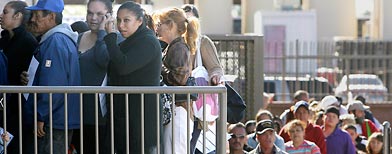Top 25 Oddball Job Interview Questions of 2010
 Looking for a new job can be stressful enough without the interviewer throwing a curveball that has nothing to do with the position you are seeking. Many job interviews feature questions that are designed to see how fast you think, or how well you cope under pressure, but some of these questions are mind blowing!
Looking for a new job can be stressful enough without the interviewer throwing a curveball that has nothing to do with the position you are seeking. Many job interviews feature questions that are designed to see how fast you think, or how well you cope under pressure, but some of these questions are mind blowing!2. “How many ridges [are there] around a quarter?”The list at Glassdoor has links to possible answers from readers. I think the correct answer to many of these might be, “I don’t know, but I know how to find the answer.”
6. “How many basketball[s] can you fit in this room”
12. “An apple costs 20 cents, an orange costs 40 cents, and a grapefruit costs 60 cents, how much is a pear?”
20. “You are in charge of 20 people, organize them to figure out how many bicycles were sold in your area last year.”

Annual raises are well above the 1.7% increase most hourly workers saw last year.
Also: 
Employers are eager to find workers in health care and five other fields.
Also: 'Actually, the retirement age is too high'
It's about time someone made the common sense argument, that if you want more jobs for the young, you want increased retirement of older workers. James K. Galbraith makes just that point in an interesting article, collectively written, called "Unconventional Wisdom" in the magazine Foreign Policy (h/t digby): The most dangerous conventional wisdom in the world today is the idea that with an older population, people must work longer and retire with less.Galbraith also addresses the false argument of the the aging populaton:
This idea is being used to rationalize cuts in old-age benefits in numerous advanced countries -- most recently in France, and soon in the United States. The cuts are disguised as increases in the minimum retirement age or as increases in the age at which full pensions will be paid.
Such cuts have a perversely powerful logic: "We" are living longer. There are fewer workers to support each elderly person. Therefore "we" should work longer. ...
In the United States, the financial crisis has left the country with 11 million fewer jobs than Americans need now. No matter how aggressive the policy, we are not going to find 11 million new jobs soon. So common sense suggests we should make some decisions about who should have the first crack: older people, who have already worked three or four decades at hard jobs? Or younger people ... The answer is obvious.
"[W]e" are not living longer. Wealthier elderly are; the non-wealthy not so much. Raising the retirement age cuts benefits for those who can't wait to retire and who often won't live long. Meanwhile, richer people with soft jobs work on: For them, it's an easy call.It's all very sensible — unless your goal is to punish the under-privileged elderly. But that would only be true in a society that rewards the over-privileged elderly; oops.

A revised formula suggests tough times have taken a worse toll in the U.S. than previously thought.
Also: 
No comments:
Post a Comment